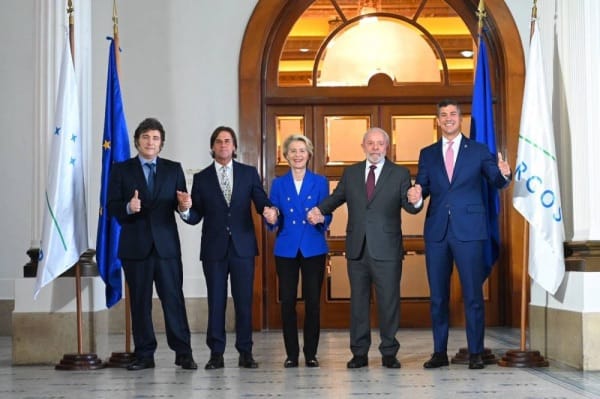EU, Mercosur finalize landmark free trade deal after 25 years of talks
The European Union and Mercosur, the South American trade bloc, announced a historic free trade agreement on Friday.

After 25 years of negotiations, the European Union and Mercosur, the South American trade bloc, announced a historic free trade agreement on Friday. If ratified, the deal will create one of the world’s largest free trade zones, connecting 780 million people and nearly a quarter of global GDP.
European Commission President Ursula von der Leyen described the deal as a “truly historic milestone,” adding, “This agreement is a powerful statement against protectionism and for open, sustainable trade.” She emphasized its potential to create economic opportunities while reinforcing global partnerships.

The agreement promises $4.26 billion in annual savings through reduced tariffs on goods such as Argentine beef, Brazilian oranges, Italian wine, and German cars. Brazilian Finance Minister Fernando Haddad called it “a game-changer for South America,” stressing that it “opens the door for new markets and a wave of modernization.”
However, the deal has sparked criticism from within the EU. French President Emmanuel Macron declared it “unacceptable” without stronger safeguards, stating, “We cannot sacrifice our farmers and the planet on the altar of trade liberalization.” Austria’s Chancellor Karl Nehammer echoed Macron’s concerns, calling for “binding commitments on deforestation and sustainability.” France has rallied Austria, Belgium, Italy, the Netherlands, and Poland in opposing the agreement, citing risks to EU agricultural sectors and insufficient environmental guarantees.
Mercosur leaders celebrated the breakthrough. Brazil’s President Luiz Inácio Lula da Silva praised the pact as “a recognition of Mercosur’s efforts to balance economic growth with environmental protection.” Argentina’s President Javier Milei emphasized its alignment with his economic vision: “This agreement reflects our commitment to free-market policies and unleashing Argentina’s potential.”
The deal is expected to significantly boost Mercosur’s exports to Europe, with Brazil alone projected to gain $7 billion annually. “This is not just a trade deal—it’s a signal that South America is ready to engage as an equal partner on the global stage,” said Paraguayan President Santiago Peña.
Despite the optimism, challenges remain. Critics have pointed to delays in ratifying previous EU trade deals, such as the Comprehensive Economic and Trade Agreement with Canada, as a cautionary tale. Greenpeace Europe has also raised concerns, warning that the deal “could accelerate deforestation in the Amazon unless meaningful protections are enforced.”
While the announcement is a landmark moment, von der Leyen acknowledged the road ahead: “The hard work begins now. We must ensure this agreement lives up to its promises—for people, for businesses, and for the planet.”














